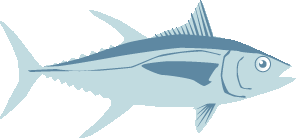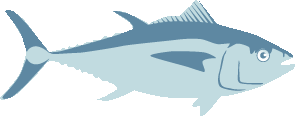Overview
This FIP covers the Atlantic Ocean stocks of bigeye (Thunnus obesus) and yellowfin (T. albacares) tunas caught in the Grenada Exclusive Economic Zone (EEZ) by vessels supplying Grenada National Export Traceability and Technology, Incorporated using pelagic longline, troll and dropline fishing gear. With the majority of the Grenada EEZ in deep oceanic water, large pelagics such as tuna dominate fisheries landings. For the purpose of this FIP, two key fisheries are considered to make up the Grenada tuna fleet: a pelagic longline and troll fishery that targets free schools of tuna and a troll and dropline fishery that targets large pelagics around anchored Fish Aggregating Devices (FADs). The longline fleet consists of about 200 vessels, the majority of which make single-day trips, while approximately 120 fishers are active in the FAD fishery. The fishery falls under the jurisdiction of the Regional Fisheries Management Organisation (RFMO) ICCAT. Within the EEZ, the development and management of marine resources fall under the jurisdiction of the Grenada Fisheries Division, a division of the Ministry of Climate Resilience, the Environment, Forestry, Fisheries, Disaster Management and Information.
This FIP covers the Atlantic Ocean stocks of bigeye (Thunnus obesus) and yellowfin (T.
This FIP aims to support gradual improvements to Grenada’s management systems and fishing practices to a point where the Grenada EEZ pelagic longline, troll and dropline Atlantic Ocean yellowfin and bigeye fishery will achieve a level of sustainability consistent with conformity against the MSC fisheries standard by end 2026. The FIP will achieve this aim through the following objectives:
- Support development of robust harvest strategies for Atlantic Ocean yellowfin and bigeye through ongoing engagement with the Grenada government and the International Commission for the Conservation of Atlantic Tunas (ICCAT).
- Support the Grenada government in its development of a robust domestic fisheries management system, including through involvement in Sub-regional and ICCAT Fisheries Management Systems.
- Establish and manage a system for independent fisheries data collection on all target species and bycatch. COMPLETED
- Guide precautionary ecosystem-based management responses through comprehensive ecological risk assessments of non-target species. COMPLETED
- Identify changes in fishing methods and gear to address the fishery’s environmental challenges including on billfish bycatch and bait use. COMPLETED
- Ensure robust supply chain traceability. COMPLETED
FIP at a Glance
| 64% | 14% | 21% |
This pie chart represents completed environmental actions. Non-completed environmental actions may contain completed sub-tasks that are not illustrated here. For more information on environmental action progress visit the Actions Progress tab.
- Complete
- Incomplete


